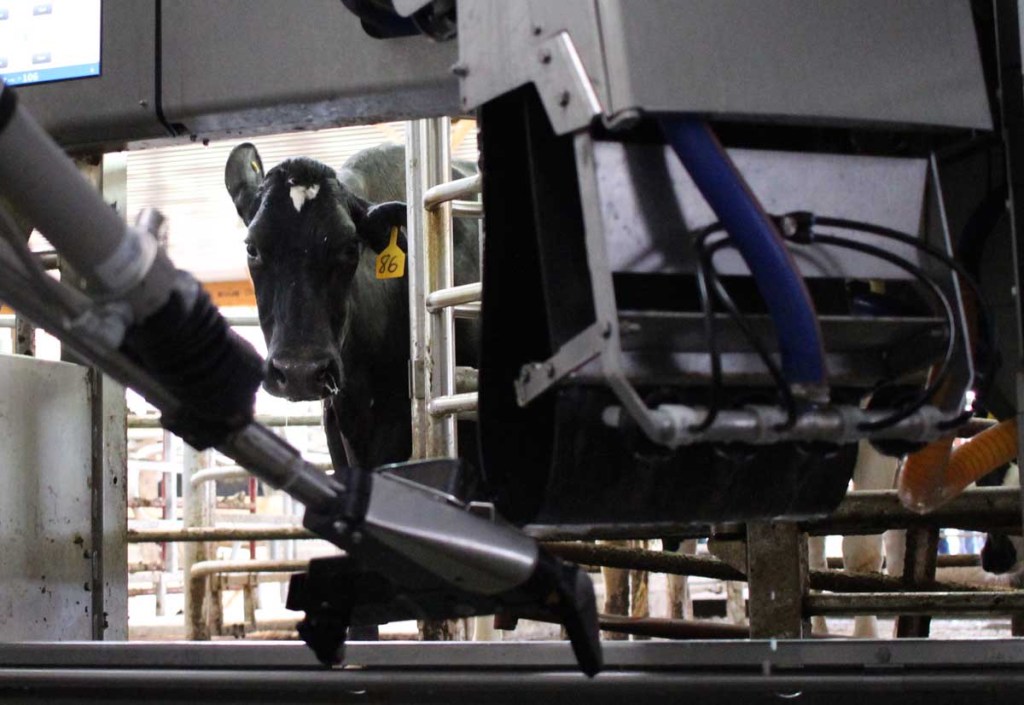VIDEO: Robots milk cows on Kentucky dairy farm
Published 10:00 am Friday, June 30, 2017

- A cow enters an automatic milking machine on Thursday at Malvern Hills Dairy in Glasgow, Kentucky.
GLASGOW, Ky. — The cows shuffle in and take their places in the stalls, but there are no milking stools and no buckets here, just cows being milked — by robots.
Malvern Hills Dairy at the Mattingly family farm features a new DeLaval VMS (Voluntary Milking System) Robot Barn, equipped with three robotic milking stations.
Stephanie Mattingly said they began using the machines on March 27, and that the new system has been a huge stress relief for her dad, Richard.
“You go from relying on people to relying on equipment,” she said, adding that, in the past, they have had a lot of issues with keeping good help. “When you own your own business, you’re committed to it every day. When you hire someone to come in, their commitment to what you’re doing is always going to be less.
“The robots are very consistent. They’re going to do it right every time.”
Mattingly said there was a steep learning curve with the new system, especially with maintenance.
“It’s pretty in-depth equipment,” she said. “So if you don’t take care of it right, it messes up. Learning the mechanics of it all has been more than what any of us were really expecting. But we’ve learned a lot.”
Mattingly said they all became mechanically inclined very quickly, and her dad likes that “he can be here and he can do all this by himself.”
“That’s what he wants,” she said.
Since she began working for DeLaval as their robotics product specialist, Mattingly said she only gets to be on the family farm “maybe one day a week,” but the new technology allows her to help out even when she is away.
“I do a lot of remote support,” she said. “I can pull up all the software on my computer wherever I am in the world.
“I can log in and see what’s going on.”
Mattingly said they now have access to data that wasn’t available in their old facility. She said they can keep track of how much milk each cow produces, and they can monitor each cow’s movement, measuring how often a cow is lying down.
“We use that to catch sick cows,” she said. “Because if her activity goes down, she’s probably sick. If her activity goes up, she’s probably in heat, which means she’s ready to breed.”
“So we use it to breed cows, but also to catch sick cows.”
“It’s a whole new world,” Mattingly said. “You can literally look at everything, see the details and say, ‘OK, this is what I can put in and this is what I’m going to get out.’
“The way that farmers work, our profit margins are small. So for us to be able to maximize the outputs with minimal input is the way to do it.
“That’s what’s allowing farmers to be effective, to be productive and make money. You have to learn to be competitive in this world.
“It’s a huge part of what’s keeping family farms around.”
Eric Risser, dairy division manager for AgCentral Co-op, the company that installed all of the new equipment, said the Mattinglys’ cows currently each produce an average of 80 pounds of milk per day.
Risser said whenever anything goes wrong with a machine, the system will automatically send a digital alert to the Mattingly family, adding that if they don’t respond to an alert, another alert will be sent to AgCentral.
Having a robotic milking system improves the quality of life for farmers and their animals, Risser said, adding that the cows voluntarily enter the machines.
“The cows actually perform better because they’re not forced to do it,” he said. “No one is herding her to a specific point. Nobody is telling her she has to be milked.
“She’s getting to do what she wants to do on her schedule.”
Risser said he thinks this technology “is the future” of dairy farming.
“You have so many data points,” he said. “You’re learning the behaviors of cows, routines of cows. It’s really interesting.”
Perkins writes for the Glasgow, Kentucky Daily Times.
“The cows actually perform better because they’re not forced to do it. No one is herding her to a specific point. Nobody is telling her she has to be milked.”
-Eric Risser, dairy division manager for AgCentral Co-op



